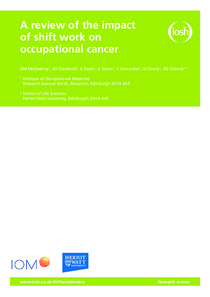A review of the impact of shift work on occupational cancer
"This report contains a systematic review of the epidemiological and mechanistic evidence from 2005 to 2015 relevant for examining the association between shift work and cancer. The systematic review is supplemented by a review of relevant health and safety practices and policies as well as a c...
| Main Authors: | , , , , , , , |
|---|---|
| Institution: | ETUI-European Trade Union Institute |
| Format: | TEXT |
| Language: | English |
| Published: |
Wigston
2018
IOSH |
| Subjects: | |
| Online Access: | https://www.labourline.org/KENTIKA-19399139124911173119-a-review-of-the-impact-of-shif.htm |
| Summary: | "This report contains a systematic review of the epidemiological and mechanistic evidence from 2005 to 2015 relevant for examining the association between shift work and cancer. The systematic review is supplemented by a review of relevant health and safety practices and policies as well as a compendium of current and ongoing relevant epidemiological work in the field. The systematic review employed standard methodology. The epidemiological evidence examining the relationship between shift work and breast cancer is now appreciable. Recent studies have better adjusted for potential confounding factors, but many still have imprecise and inconsistent definitions of shift work. Across all the epidemiological evidence examined the overall relative risk is around 1.2 or 1.3. During the write-up of this report a meta-analysis of prospective epidemiological studies was published which provides evidence that the overall relative risk for breast cancer in relation to shift may not be raised at all. The epidemiological evidence for other cancer sites remains relatively sparse and the evidence supporting a causal association remains somewhat limited. Suppression of night time melatonin production and or obesity remains the most plausible biological mechanism for the association with breast cancer. A number of practices have been implemented, for example shift design, pharmacological interventions etc. to reduce the potential carcinogenic risk of shift work, but have not yet been fully evaluated. The main recommendations emanating from this review relate to encouraging employers to provide healthy and nutritious food for shift workers as well as the opportunity to exercise and access programmes for smoking cessation and moderating of alcohol consumption. Encouraging employers to facilitate employee participation in national cancer screening programmes is also recommended. Further prospective epidemiological studies with well characterised data on shift working patterns, as well as good data on known and suspecting confounding factors remains warranted." |
|---|---|
| Physical Description: | 107 p. Digital |

